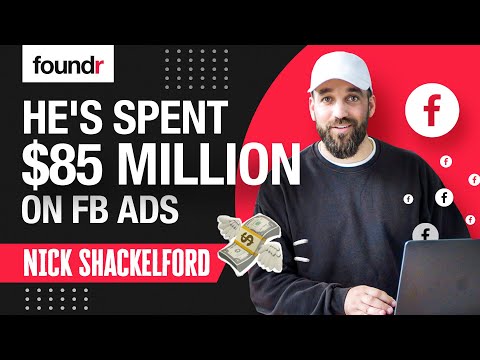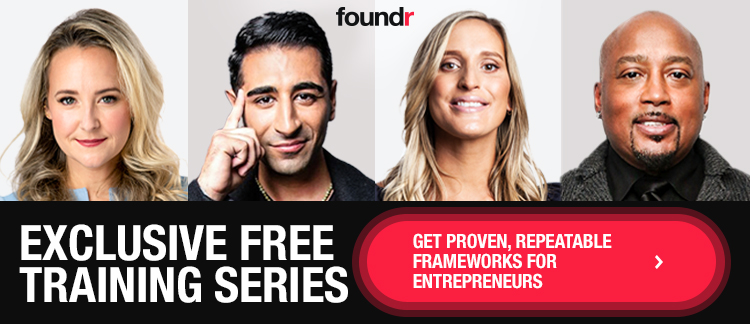It’s easy to just start a business. Building a business that matters, not so much. It takes equal parts grit and know-how for today’s entrepreneurs to put their ideas into action for the successes of tomorrow.
You’ve already got the ideas and determination required to kick things off. And our team here at Foundr is dedicated to providing resources to help you along the way. The type of proven strategies that help you expedite your achievements and create a legacy you can be proud of.
To gather these tools, tips, and techniques, we seek out the greatest founders from throughout the business world. We’ve interviewed hundreds of entrepreneurs to get actionable advice.
The interviews are featured in our magazine, podcasts, YouTube channels, and social accounts. And with so much wisdom to draw from, we thought it would be great to bring you 5 of our favorite lessons from past interviews.
Lesson #1: Remove Barriers and Share What You Have with the World
There’s great power in brand positioning and product targeting. So it’s always smart to customize your products and services to those individuals who are most likely to use them.
But that doesn’t mean you should cut others out of the equation.
Matt Pohlson, co-founder and CEO of Omaze, learned this lesson early in his career. Omaze is an online fundraising platform that uses once-in-a-lifetime opportunities to incentivize people to contribute to worthy causes. Your contributions serve as entries in the giveaway.
Examples of past giveaways include 2 seats aboard the first Virgin Galactic space flight, hanging out with Jason Mraz in his home studio, a shopping spree with Julia Roberts, all-access passes to the Super Bowl, and a magical day with Dolly Parton at Dollywood. The craziest prize was the time they gave away a Lamborghini and the winner was personally handed the keys by Pope Francis.
Even when offering multi-million-dollar prizes, Omaze democratizes the process and makes them potentially available to anyone who makes a nominal contribution to the cause. This approach has enabled Omaze to thrive, give more than $130 million to hundreds of charities, and earn a spot on Fast Company’s 2020 list of “Most Innovative Companies.”
This innovation was spurred by a disappointing experience that Pohlson and his friend had while still in school. It all started when they scored tickets to a high-caliber auction event where the attendees bid on the opportunity to play a one-on-one game of basketball against Magic Johnson and then go to a Lakers game with him.
Pohlson is a die-hard Lakers fan and reveres Magic Johnson. So the prospect of winning that experience was mind-blowing. But as the bids quickly surpassed $15,000, there was no way he could afford to participate.
On the drive home, Pohlson and his friend discussed how the event was problematic because it was so exclusionary. Thousands of other people would have wanted to participate for the chance to win the prize. In fact, these people who couldn’t afford to attend and participate would’ve probably been more thrilled by the potential of the prize more than the wealthy people who bid on it.
Ultimately, the raffle only raised $20,000 or so from the winning bid. All the lower bids were obsolete and did nothing to increase the amount that would go to the charity. But if the event planners had opened the experience as a contest available to all, who knows how many hundreds of thousands of dollars might have been raised?
The Takeaway: You should make your product or service accessible to all people who would be interested. You’ve got something great to share, so share it with the world.
Lesson #2: Replace Fear with Love
Here’s another gem that comes from Matt Pohlson’s interview. Not a lot of people know this, but Pohlson had a near-death experience a few years ago that drastically altered the way he approaches his life and his business endeavors.
Pohlson had been feeling ill for some time and ended up in the hospital. After hours of tests, doctors still couldn’t identify the source of his pain and discomfort. Spoiler alert: Scar tissue from a childhood surgery had actually detached all these years later and disrupted his organ functions.
The situation became dire when Pohlson flatlined. The hospital loudspeaker blared out the message that there was a “code blue” in his room. His family was waiting outside the room when they heard those chilling words.
Pohlson’s mother, who works in a hospital herself, immediately ran to his room. Staff members tried to stop her from entering, but she forcefully told them that she’d brought her son into this world and was going to be there if he was leaving it.
As one doctor exited the room a short time later, he commented to a colleague in the hallway that they’d lost the patient. Pohlson’s family members overheard this conversation and were overcome with grief.
Yet, Pohlson was eventually resuscitated and opened his eyes to see a room full of people anxiously staring at him.
This experience taught him that no experience, even death, is as bad as the fear of it. He says that we spend too much time projecting what could go wrong and creating extreme narratives. Prior to that fateful day, Pohlson had a fear of dying. But it turned out to be an amazing experience.
That lesson quickly became beneficial to the efforts he was putting into Omaze.
“I used to always think in the early years that if this goes under, then all these people who work for us will lose their jobs,” he recalls. “And if they lose their jobs, it’ll hurt their families and I’ll be responsible for that. And what’s going to happen to my family?”
But coming back from the brink has given him a fuller appreciation of life and a healthier relationship with fear. He says that fear can become crippling. And the opposite of fear is love.
The Takeaway: Stop worrying all the time, you can spend more time projecting love and your vision into the world.
Lesson #3: Let Your Unique Benefits Shine Early and Often
It can be difficult to organize the hierarchy of marketing messages. After all, we’re entrepreneurs who are passionate about our businesses. We have so many exciting things to tell our audiences.
But in the rush of competing ideas, it’s easy for your most important message to get overshadowed. And what is that key message? In his Foundr business course, marketer Nick Shackelford lays out the essential order of things.
Who is Nick Shackelford? He was part of the Apple team that helped sell a trio of quaint, little products known as the iPhone 7, Apple Watch, and iPadPro. Perhaps you’ve heard of them.
Shackelford is now the managing partner of Structured Social, which is Facebook’s premier growth partner. He’s spent more than $100 million on Facebook ads over the past several years, which has taught him crucial strategies for outselling the competition and meeting customers’ needs.
Facebook actually features some of Shackelford’s campaigns as case studies to help other entrepreneurs. Perhaps you’ve seen them. Examples include:
- The $255,000 in sales that Diff Eyewear enjoyed in just their first 24 hours post-launch. In less than 2 weeks, the brand sold 16,000 units. The 2.6x return on ad spend set them up for future success.
- The epic product launch that saw Pupsocks bring in $13 million in sales in about a month. The 3.7x return on ad spend definitely turned a lot of heads.
- How Snow Teeth Whitening launched their product line and sold 23,000 units, good for a 1.7x return on ad spend.
While the specific tactics might change, Shackelford uses the same principle when designing his video ads. Ready for it? Always show your product’s value proposition within the first 3 seconds. The average drop-off occurs around 5 seconds, so you’ve got to frontload the value and relevance of your product.
“The quicker we can get that first value proposition, with the product in place, that’s money,” explains Shackelford. “That’s when we’re gonna win.”
The Takeaway: Embrace the value-first mentality in all your advertising and brand messaging. If you’re writing an email headline for a new product, make sure it includes the value proposition. The same goes for videos, radio ads, podcast ads, billboards, press releases, and whatever else you’re tackling.
Lesson #4: It’s Fun to Solve Problems
Shackelford shares another key lesson in his course. After testing more than 100,000 different ads, he’s found that after you feature the value proposition it’s important to show people enjoying your product.
Does that mean every ad features a group of people laughing uproariously as they use your product? Not at all. The enjoyment can come in different forms. But what’s important is that their problems are being solved.
For example, you might sell a special charger that can help car batteries have enough juice to start up on the coldest winter days. Your ad could show the relief on a mother’s face as she gets her truck running and is able to drive her children to school on a frigid December morning.
Whether your product brings actual laughs or just the relief and contentment of having a challenge resolved, it should deliver enjoyment.
The Takeaway: Featuring emotion in your ads will resonate with customers. They’ll see themselves in those scenarios and understand your value proposition on a whole new level.
Lesson #5: Stay Focused and Stay the Course
Young entrepreneurs usually possess an abundance of energy and zeal. But do they have what Alex Hormozi refers to as “stick-to-itiveness”?
Hormozi is a seasoned entrepreneur and investor who runs a portfolio of companies with his wife that brings in more than $85 million annually. With an eagle eye for niches with potential, Hormozi’s businesses include education, licensing, SAAS (software as a service), ecommerce, and traditional brick-and-mortar services.
Given his decades of experience in growth and monetization, Hormozi has become a sought-after speaker and consultant. He also contributes articles to the likes of Forbes and Entrepreneur.
In a recent interview with Foundr’s Nathan Chan, Hormozi shares what he sees as the main reason that so many young entrepreneurs fail. As he explains:
“The biggest mistake that they make is that they’re in such a rush, that they try a new thing every 90 days. And my fear is that there are going to be so many guys who have been trying to make it big in 90-day sprints on the next new thing, that 10 years from now, they’ll think that they’re 90 days away. When if they just stuck with the same thing for 10 years, it would be unreasonable for them not to be exceptional. Because no one has stick-to-itiveness. And if you stick with it, even if you suck, you’ll be better than most people after a year. And after 10 years you’ll be almost untouchable because no one sticks with anything.”
Wise words. It’s so easy to get distracted by new shiny objects on the horizon, but when you’re passionate about an idea, you should see it through. That doesn’t mean every pursuit will be a smashing success. But at least you’ll know that you fully tapped into its potential. And you’ll inevitably learn many valuable lessons along the way.
The Takeaway: Stick to an idea or vision that provides you lasting passion and energy.
More Proven Small Business Lessons
If you want more business lessons from our network of proven entrepreneurs, visit our library of free business courses. From finance to product selection to negotiating, these courses contain strategies that will help your business reach its fullest potential.
Who knows? Maybe Facebook will be using you for their next case study.
The post 5 Essential Lessons for Your Small Business appeared first on Foundr.





